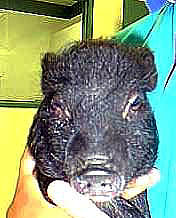Potbellied Pigs—Care Of
Potbellied pigs first entered the United States in 1985, and to some extent, have been growing in popularity. Newborn pigs weigh about two pounds and a mature three-year-old animal can reach 100 pounds. Their average lifespan is 12 to 15 years and female pigs reach maturity at seven months. Males reach maturity at five months of age.

Diet
One of the newer specialized mini-pig rations is probably best. Standard 14 to 16 percent protein swine rations can be used; however, these rations require extra supplemental vitamins and minerals. The pig’s higher fiber requirements can be met with occasional fresh vegetables and fruits. As can be expected, adult pigs are prone to obesity, so it is best to never feed "junk" food.
Housing
Potbellied pigs are most comfortable at 60-70 degrees F. Pigs tolerate cold better than hot. Shade plus fresh water is essential if the pig is housed outdoors. Pigs also prefer a "nesting" area for sleeping.
Medical Care
Potbellied pigs should have a veterinary medical examination once yearly including vaccination. There is some controversy regarding which commercial swine vaccines are useful for pet pigs. Many veterinarians recommend vaccinating against erysipelas, leptospirosis and parvovirus.
Vaccines for young pigs can be started at six weeks of age and boosted three weeks later. Once repeated, the vaccines are given yearly. A fecal exam for parasites is also performed.

It is almost impossible to keep a non-neutered pig as a pet. Non-neutered female pigs have a 21-day estrus cycle and non-neutered males emit a very strong urine odor. A female can be neutered as early as three months of age and a male can be castrated when its testicles have descended. The surgical procedures are similar to spays and neuters in dogs.
[ Search Articles ] [ Article Index ]
